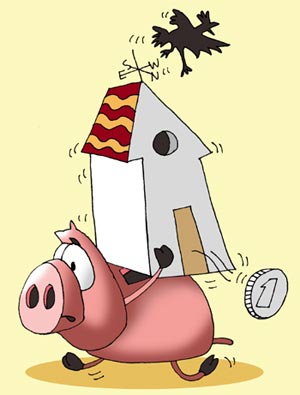
There are certain myths with regards to home insurance and through this article, we attempt to deconstruct them
Illustration: Uttam Ghosh/Rediff.com
Have you ever wondered which is worse?
A devastating earthquake or picking up the pieces of life after surviving such an earthquake?
Perhaps the second one requires more resilience and determination. It also requires the hand of providence and of course good planning habits.
It would be a shattering to see one's home crumbling in front of their eyes and would be all the more depressing if the house is not insured.
Myth # 1: Home Insurance does not cover hand-of-God incidents
It is a general feeling that home insurance does not cover natural disasters. However, mishaps like fire, earthquake, flood and other perils are amply covered in the first section of most home insurance policies.
In most of the plans this is a mandatory coverage.
In order to understand what is covered under the policy, it is important to read the policy documents carefully. Only after considering the terms of the policy in detail should one commit to purchase the policy.
It is a fact that some insurance companies may cover a particular form of natural disaster while others might not do it. It is always a good practice to compare different policies before buying one.
Myth # 2: Settlement of claims is a cumbersome process
Many people shy away from buying a home policy simply because they feel that the claim lodging and settlement process is innately cumbersome. Actually it is not that intimidating and just need to follow a particular procedure.
When the property of the insured is damaged due to some calamity, intimation has to be given to the particular insuring company as early as possible, either to the local office or the main office as per the stipulations in the policy.
The insurer on its part will send an agent to survey the extent of damage to the policyholder's property. Once the agent files the report, decision is taken regarding the value of the claim that is permissible as per the policy.
The insurer might ask for certain documents from the insured before they finally go about the process of settling the claim.
With the gradual and progressive improvement in technology a lot off ease has come about in the process of storage of policy documents. Now policy documents can be stored in dematerialised or electronic format also.
This helps in case where the original policy has been misplaced or lost and in such situations the only question that the insurer asks is the date when the policy was taken.
Myth # 3: Low insurance premium means low insurance coverage
Insurance coverage for homes and premium amount payable are not always directly proportional. If the home to be insured is already equipped with such safety devices as fire alarm, and burglar alarms, it is likely that the insurer will offer discounts on the premium.
Judicious decisions while buying a policy will help in keeping the premium cost low. For example in areas, which are clam and peaceful a cover for riot and terrorism might not be required at all.
As these natural calamities are not very frequent, the risk for the insurer is low. So the premium will be obviously low.
Myth # 4: It is necessary to own the home for having it insured
It is often that people are under the impression that in order to insure their place of residence, they need to own it. This is not true.
The house owner can insure the basic structure of the house that s/he is renting out.
A tenant can always insure the belongings in the house they are residing in. If they happen to change homes, the insurer can approve the change of address.
Myth # 5: Burglary is not covered
Home insurance policies cover not only damage caused by natural disasters but also damage or loss caused by robbers burgling the house or even attempting to burgle it.
Individual items of value like pieces of jewellery, documents, gadgets and fittings can all be insured. However, discretion may be used to insure only the valuables, else the premium will be substantially high.
Conclusion
While buying an insurance policy it is imperative that the policy document is studied thoroughly.
Clarifications may be sought in case it is felt that there is any ambiguity in the policy clause.
With online policy buying becoming simple, it is an easy to compare the various policies online before taking a final call.
The author is Ramalingam K, CFP CM is the Chief Financial Planner atholisticinvestment, a leading financial planning and wealth management company






